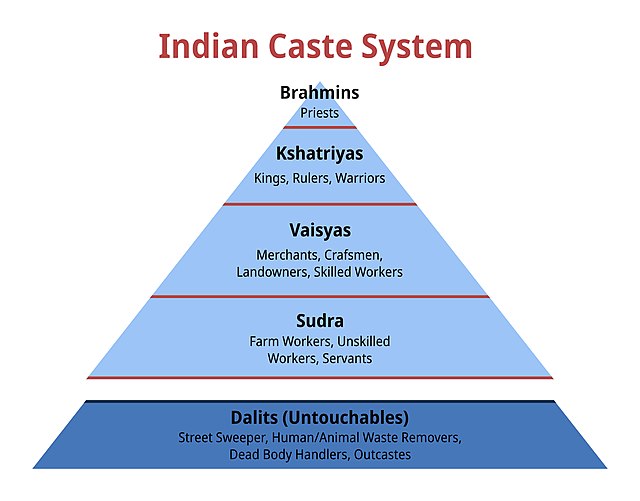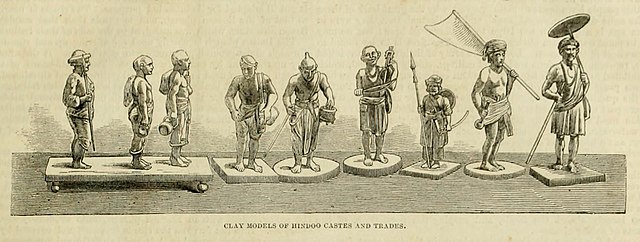Opinion: The Indian Diaspora In Silicon Valley Has a Caste Advantage That Hides Under Deafening Silence
Clay models of Hindu castes
May 29, 2023
The South Asian diaspora must wear a cloak of shame now that it has forced a city in the United States to recognize and take action against a discriminatory system that immigrates to the West every time a Hindu does. The Seattle City Council passed an ordinance on Feb 21 prohibiting caste-based discrimination. With a more connected world, globalization has resulted in the spread of the insidious caste system across the globe.
The ordinance was proposed by the city council’s only Indian– American member, Kshama Sawant, based on statistical and anecdotal evidence about caste-based discrimination among the Indian workforce in the U.S. “Caste discrimination doesn’t only take place in other countries. It is faced by South Asian American and other immigrant working people in their workplaces, including in the tech sector, in Seattle and in cities around the country,” Sawant said to Reuters when the proposal was introduced.
With its roots deeply ingrained in the social and cultural fabric of ancient India and Hinduism, caste discrimination is practiced and continues to persist in India and other South Asian countries in many forms despite being outlawed. The highest in the social hierarchy being Brahmins (priests and scholars) and the lowest, the Dalits (termed “untouchables”). A person comes stamped with a permanent social tag that is indicated by their last name, which almost always reveals a person’s caste.

Caste is an identity that places sections of society at an unfair advantage by virtue of birth, which also helps them immigrate to countries like the United States and become what Varsity calls the “model minority.”
“Brahmins in the West are in the habit of claiming their genetic merit. They had headway into education due to an early entry and a system devoted to excelling them in India,” tweeted Dr. Suraj Yengde, an award-winning Indian scholar and activist. “Once they become diaspora, they claim their minority status to become World Bank chiefs and Google heads.”
This does not mean that Sundar Pichai, the CEO of Google, and Satya Nadella, the CEO of Microsoft, both upper-caste Hindu Brahmins who immigrated from India are undeserving of their position. It means that they grew up with a head start so big that that millions of Indians and other South Asians can never catch up in their lifetime.
Indian nationals have done so well winning high-paying jobs in Silicon Valley that they make up 25% of the technical work force there, according to Wired. Those who have achieved success in these positions tend to come from historically privileged castes and come from privilege in India. Unfortunately, the Dalits who do manage to beat the economic and social disadvantage and leave the country still face prejudice in the U.S.
Equality Labs, a South Asian Dalit rights organization, published a report titled “Caste in the United States” in 2018 that claims that over two-thirds of Dalits living in the country have experienced discrimination based on their caste. These biases can take many forms, such as caste-based slurs, or being treated differently because of one’s perceived “untouchability.”
More than 250 complaints were received by Equality Labs, from employees of major tech companies including Google, Netflix, Amazon, and Facebook, accusing their Indian colleagues of using casteist slurs, discriminatory hiring and firing practices, sexual harassment, and aggressively seeking out evidence of a Dalit’s caste.
A 2020 lawsuit against Cisco by a California state agency alleged caste discrimination against a Dalit engineer that meant denial of professional opportunities, promotions and raises, according to The Seattle Times. The lawsuit claims that the defendants, Sundar Iyer and Ramana Kompella, who were the engineer’s supervisors and hail from higher castes in India, were aware that the engineer in question was a Dalit, according to CNN Business. “Caste discrimination is in every US. company where Indians are working,” said a woman using the pseudonym “Maya” to protect her identity to Vice News.
It is an unfortunate truth that many people in the world, including in India, remain incognizant of the perils faced by those born into a lower caste. “The HR departments in so many of these companies just are not culturally competent enough about the issues of caste to even understand the recording of these issues,” says a person going by the pseudonym “Soundarajan” to Vice News.
I know an Indian who once said that the caste system “does not exist anymore.” This lack of awareness begs the question – how can they help drive the change needed to eradicate a pervasive problem if they believe that it has ceased to exist?


